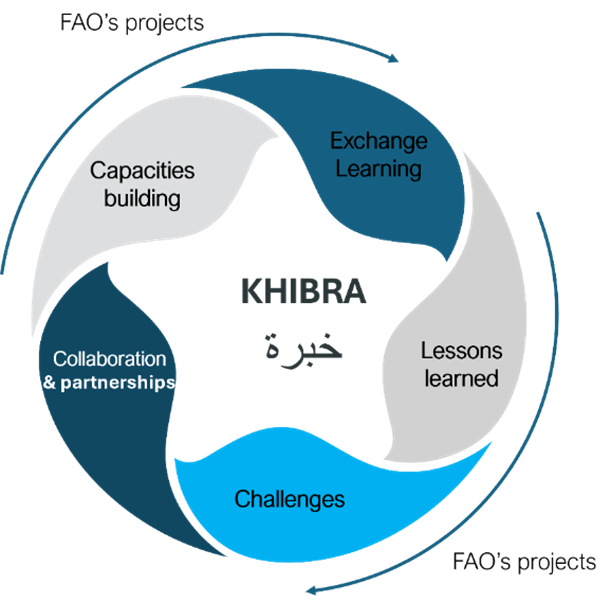KHIBRA: A Regional Knowledge Hub for Integrated Biodiversity Resilience and Agrosilvopastoral Food Systems

The Regional Knowledge Hub for Integrated Biodiversity Resilience and Agrosilvopastoral Food Systems (KHIBRA) is an FAO initiative under Regional Priority 3 “Greening Agriculture,”, designed to strengthen knowledge sharing and collaboration on drought-resilient silvopastoral systems across the Near East and North Africa (NENA).
KHIBRA is an innovative platform that consolidates regional expertise, policy guidance, and investment insights to support sustainable land management and biodiversity resilience. By serving as a central hub, it enhances access to best practices, fosters cross-country learning, and connects stakeholders with actionable strategies for addressing desertification, land degradation, and climate adaptation. Through this integrated approach, KHIBRA aims to accelerate the adoption of effective agrosilvopastoral solutions, strengthen local and national capacities, and contribute to regional policy alignment on sustainable food systems.
Why KHIBRA?
Despite the urgent need for improved land management in NENA, silvopastoralism remains an underfunded and underutilized approach due to limited awareness, coordination, and investment capacity. An FAO assessment across Algeria, Jordan, Mauritania, Morocco, Saudi Arabia, Sudan, and Tunisia highlighted the challenges of land degradation, water scarcity, and climate-induced crises, which threaten agrosilvopastoral communities and food systems. FAO’s regional project analysis also revealed that while significant resources are allocated to land management, there is a lack of structured knowledge-sharing mechanisms and coordinated policy support for drought-resilient interventions. KHIBRA aims to fill this gap by facilitating regional dialogue, strengthening policy frameworks, and unlocking new investment opportunities tailored to country-specific needs.
KHIBRA is designed to:
- Enhance knowledge-sharing and collaboration by consolidating best practices, lessons learned, and innovative solutions for drought-resilient Silvo pastoral systems through an accessible online platform.
- Strengthen technical capacity by supporting country-to-country learning, hosting regional training sessions, and developing evidence-based policy recommendations.
- Improve investment readiness by helping NENA countries design and implement drought-resilient Silvo pastoral investment proposals aligned with international restoration commitments, such as the UN Decade on Ecosystem Restoration.
- Advance cross-sectoral policy coordination by promoting harmonized approaches to land and water management, biodiversity conservation, and rangeland governance, aligned with national and regional priorities.
KHIBRA’s objective
By systematically addressing knowledge gaps, investment barriers, and policy inconsistencies, KHIBRA aims to transform how NENA countries approach silvopastoral resilience. The hub will document and disseminate best practices, ensuring that innovations in agroforestry, soil conservation, and drought-smart grazing are scaled efficiently across diverse landscapes. Additionally, KHIBRA will facilitate strategic partnerships, enabling countries to access financial mechanisms previously unavailable to them individually. Through coordinated action, KHIBRA will ensure that silvopastoral systems move from being an overlooked solution to a central pillar of regional land management and climate adaptation efforts.
